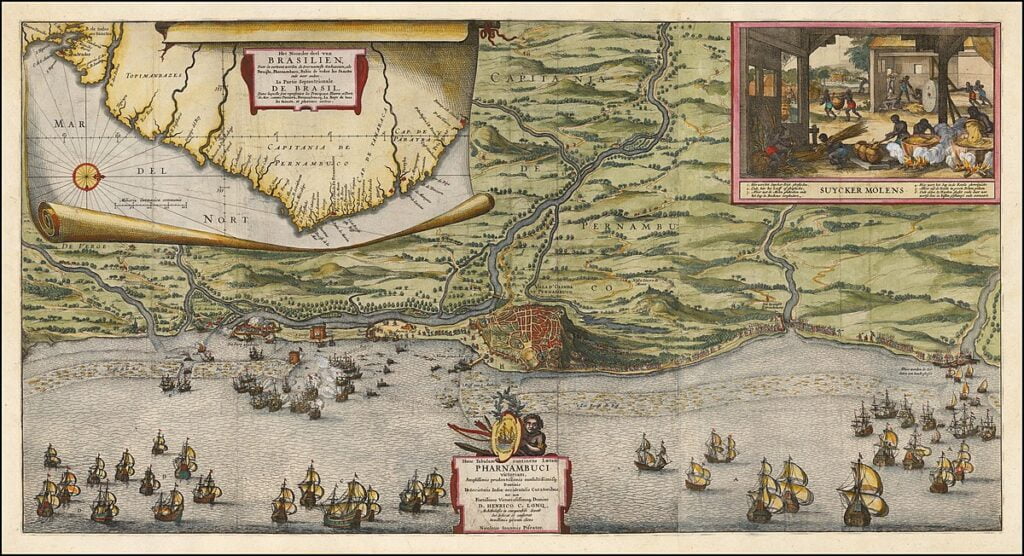Introduction
In this article, we will explore the history of the Dutch invasion and its repercussions in the historical context. We will address the motivations behind the invasion, the main conflicts and battles that occurred during this period and the consequences that this invasion had for the parties involved. Let's delve into this fascinating history and understand how the Dutch invasion shaped the region's historical landscape.
Dutch Invasion Background
In the 17th century, the Netherlands (now known as Holland) was an important maritime and commercial power in Europe. Seeking to expand their colonial empire and conquer lucrative territories, the Dutch set their sights on South America, particularly the Portuguese colonies in the region.
Motivations for the Invasion
The Dutch invasion had multiple motivations. One of them was the search for financial profit, since the Portuguese colonies were rich in natural resources, such as sugar and gold. Furthermore, the Dutch intended to weaken their main commercial competitor at the time, Portugal, and dominate trade routes in the Atlantic Ocean.
Another motivation was the religious issue. While the Portuguese were fervently Catholic, the Dutch were Calvinists. The invasion was also an opportunity to spread their faith and conquer territories for Protestantism.
Main Conflicts and Battles
During the Dutch invasion, several battles and conflicts occurred between Dutch and Portuguese forces. The Battle of Guararapes stands out, where several disputes took place between the two armies, and the Battle of Recife, considered one of the most important of the time.
These battles were marked by advanced military strategies and the use of superior nautical technologies by the Dutch, such as the use of warships and cannons.
The influence of the Dutch invasion in Pernambuco
The Dutch invasion in the state of Pernambuco, with Recife as its epicenter, had profound influences on the various spheres of society and culture in the region. Firstly, the Dutch presence brought a series of changes to the city's administrative and urban structure. Recife was modernized with the construction of bridges, canals and fortifications, leaving an architectural legacy that is still visible today.
Furthermore, the presence of the Dutch had a significant impact on the local economy. They introduced more efficient sugarcane cultivation techniques, as well as promoting trade and industry in the region. This contributed to the enrichment of Pernambuco, making it an important economic center in the Brazilian colonial context.
Finally, the Dutch invasion also left a cultural legacy. The Dutch brought with them European influences that enriched the cultural life of the region. Elements of Dutch culture were incorporated into local culture, creating a unique fusion of traditions that is still celebrated in festivals, cuisine and in the daily lives of Pernambuco residents. Thus, the Dutch invasion of the state of Recife not only marked a period of conflict and resistance, but also left a lasting impact on several aspects of regional life.
Conclusion
The Dutch invasion was an important historical milestone in the relationship between Europe and South America. Their financial and religious motivations were decisive for the success of this venture, leaving a cultural and economic legacy that is still present today. The story of the Dutch invasion teaches us the importance of understanding the different nuances of conflicts and historical events to better understand the world in which we live.
FAQ
1. What was Portugal's role during the Dutch invasion?
Portugal firmly resisted the Dutch invasion, fighting to protect its territories and interests in Brazil. Despite battles and territorial losses, Portugal eventually managed to expel the Dutch from the region.
2. Why is the Dutch invasion considered a historic milestone?
The Dutch invasion is considered a historic milestone because it brought important geopolitical and cultural changes to the region. The consequences of this invasion shaped the future of relations between Europe and South America.
3. What were the cultural influences left by the Dutch in Brazil?
The Dutch left significant influences on Brazilian culture, especially in the northeast region of the country. Architectural, culinary and linguistic features are examples of Dutch cultural contributions to Brazil.
4. Why were the Dutch interested in conquering the Portuguese colonies?
The Portuguese colonies were rich in natural resources, such as sugar and gold, which aroused financial interest from the Dutch. Furthermore, the religious issue and the dispute between Catholicism and Protestantism also served as motivation.
5. How long did the Dutch occupy territories in Brazil?
The Dutch occupied territories in Brazil for approximately 24 years, between 1630 and 1654. Their presence left significant marks on the history and culture of the northeast region.
